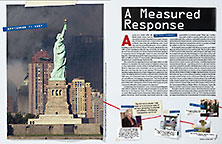One part intellectual salon for counterterrorism issues and one part clearinghouse for hard-to-procure documents and analysis, the Center on Law and Security arose from the unique vision of its founder, Executive Director Karen Greenberg. By welcoming a broad range of views, the center has become a respected institution in policy, scholarly, law enforcement, and media circles. Shortly after her book The Least Worst Place: Guantánamo’s First 100 Days was released in March, she sat down with CLS fellow and Pulitzer Prize–winning journalist Lawrence Wright to discuss her work.
Lawrence Wright: The Center on Law and Security is the strangest academic institution I have ever seen. There’s a mixture of academics and cops and spooks that you would never see in any other institutional setting. What kind of model did you have?
Karen Greenberg: I didn’t have a model, but I had one goal: reality. If you start with practitioners, you’re guaranteed that some realistic relationship between theory and practice will take place.
LW: One thing that strikes me in attending the center’s events is that there is such a range of political views. It’s not easily categorized as being left or right. Is that deliberate?
KG: It’s important to listen to people no matter what end of the spectrum they’re on because they believe what they think, and they think they’re serving a positive end by their ideas. I’m always wanting to bring a broad range of perspectives— provided they are willing to listen to each other—to the table.
LW: And your reach is not just American but international.
KG: Our first fellows were from Spain and the Continent. We’ve kept the transatlantic and Middle Eastern dialogue as alive as possible.
LW: Why is this center at NYU?
KG: Because it has a vibrant law school that already has a reputation for attending to public policy matters. The center was created in the context of the Bush administration. Now that that administration is part of history and Obama has turned a new page, how is that going to affect the center’s work? We had to pay so much attention to the policies of the Bush administration that it limited us in scope. Now we are branching out into larger issues of national and global security. So we’ve started a civilian military project, we’re doing some work on food security, and we’re increasing our focus on foreign policy and the way it relates to our law enforcement and military strategies. And of course, we’ll continue documenting whatever needs to be documented for current journalists and future scholars.
LW: Do you feel you’re actually going to be able to affect the policies of this administration?
KG: Without a doubt. How? The center was created as a place to broaden the perspective of practitioners. Having an institute that can take the time and effort to think through discrete issues such as detention or privacy could prove to be invaluable.
LW: Now, torture: How did you decide to champion this cause of shining light on practices of torture?
KG: I had stumbled upon a national policy that, once named and exposed, I thought would disappear—because it was beyond my imagination that there would be a government that would embrace this policy as laid out in the memos. And then it became a cause only because it so obviously was the wrong road to go down.
LW:Was it your interest in exploring this issue that led you to Guantánamo?
KG: The detention issue has been central to the war on terror and our need to design a policy, whether we’re having terrorism trials domestically, which the center has spent a great deal of time analyzing and collecting data on, or whether at Guantánamo, Bagram, or Abu Ghraib. And so it was the detention issue and the possibility of trials that led me to Guantánamo, not necessarily torture.
LW:How does working in this dark area, on such dark issues, affect your outlook?
KG: People used to say when I first took this job, “How can you think about these things all the time? Don’t you get really scared?” You could get scared thinking about some of the scenarios. But our feeling at the center is the more you know, the better informed you are, the safer you feel. And there are a lot of really good, smart people working on this, and the more they have a say and the more they’re in government, the safer we are.
—
